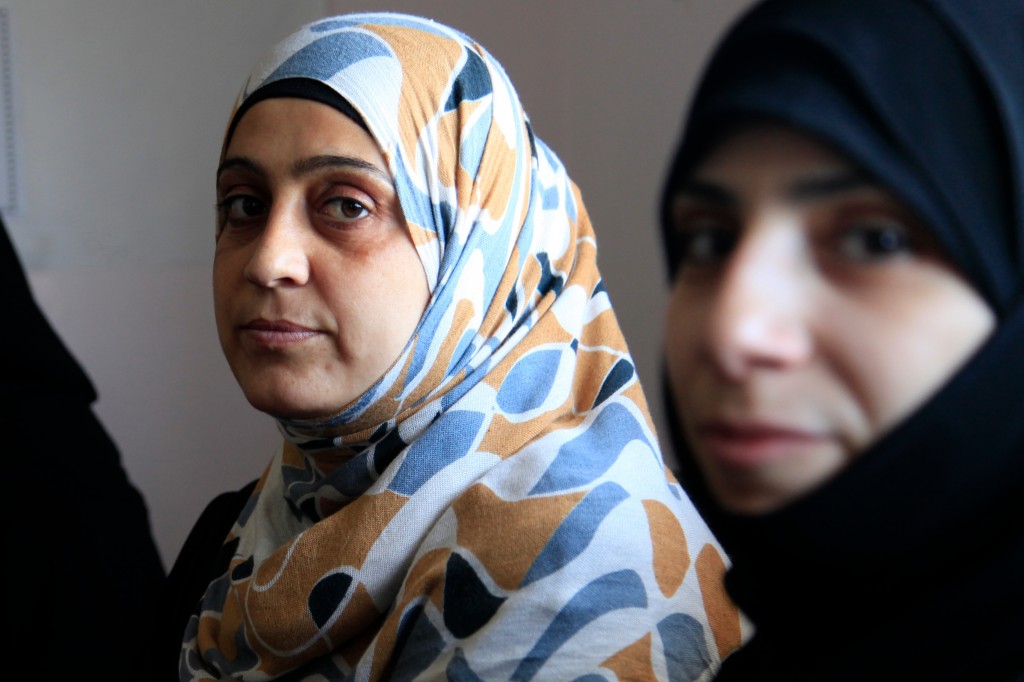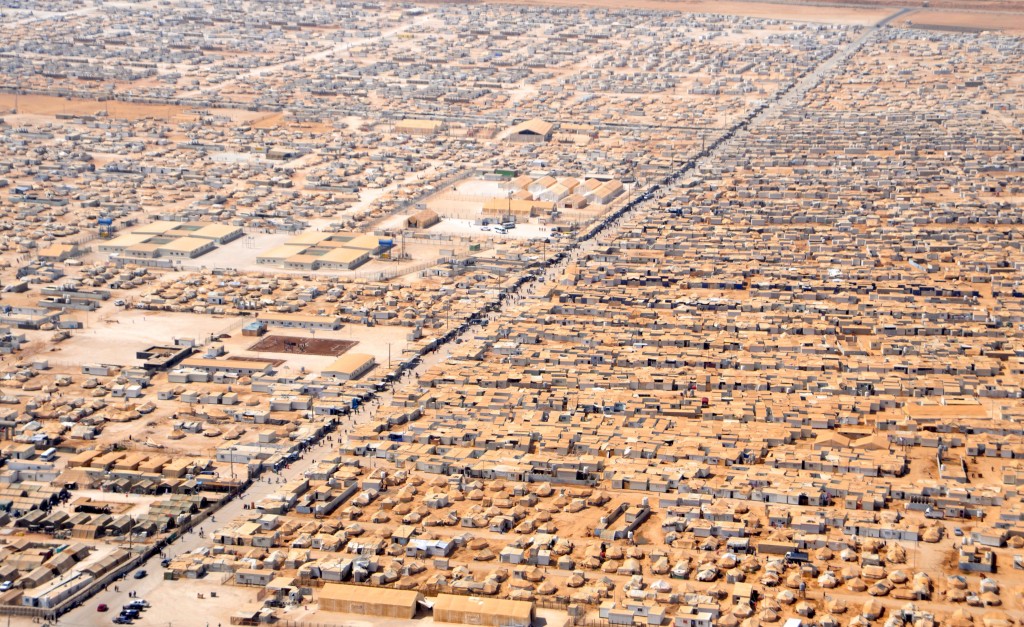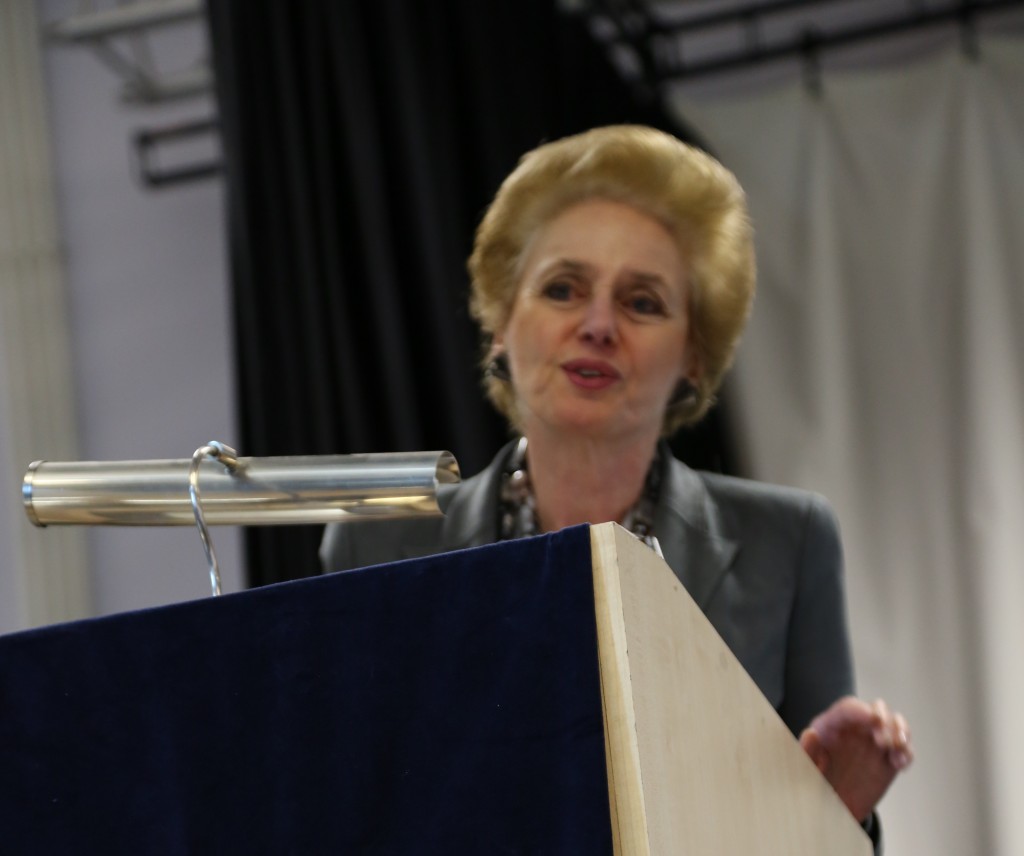Not enough funds, worldwide indifference, logistical difficulties—the challenges are great, but a few organizations are working to improve the lives of Syrian refugees.
If the Bashar al-Assad regime that still rules Syria is ever removed from power, its most enduring legacy will be symbolized by the millions of refugees who have fled the country since it erupted into brutal civil war in 2011. In August 2014, the number of externally displaced Syrians passed the three million mark for the first time. This means, in simple and stark terms, that the country once famous for maintaining the kind of stability that only a totalitarian regime can provide has now presented the world with the worst refugee crisis since World War II.
For the most part, the world seems to have no idea what to do about this devastating humanitarian crisis. But a small and dedicated group of activists, led by Georgette Bennett, president of the Tanenbaum Center for Interreligious Understanding and a New York-based interfaith activist who founded the Multi-Faith Alliance for Syrian Refugees in Jordan (MFA), is trying to change that.
She and her colleagues are fighting an uphill battle. The type of attention, funds, and supplies that refugees from other humanitarian crises tend to receive simply haven’t been forthcoming when it comes to the Syrian crisis. “I don’t think it’s donor fatigue,” Bennett told me, referring to the phenomenon in which disasters seem so prevalent and unsolvable that people simply give up on trying to help the victims. Rather, it’s because of the nature of the Syrian war itself. “We’ve seen so much brutality from the regime,” she says, “as well as from the extremists in the opposition,” that potential donors to Syria can’t tell “who the good guys are, who it is that we need to help.” In other words, the very forces that created the crisis and claimed the lives of over 200,000 Syrians have colluded to make the struggle of the survivors to exist as miserable as possible.
For David Miliband, the former British Foreign Secretary who now heads the International Rescue Committee in New York, Bennett’s efforts are a welcome contrast to the apathy that has defined the public response to the refugee crisis. “The greatest antidote to the sense of impotence is the proof that you can make a difference,” Miliband told me. In that sense, he continued, “the commitment of people like Georgette to build new coalitions to advance humanitarian values is important and admirable.”
Bennett is herself the child of Jewish refugees from Hungary. Her parents, she told me, suffered under both the Nazi occupation during World War II and the Soviet occupation that followed. Recently, she found the passenger manifest of the Ile de France, the ship that brought her to the United States with her parents. Alongside each passenger’s name was his or her nationality. But in the case of the Bennett family, the notation read “stateless.”
Bennett’s childhood experience left her with a “special sensitivity” towards refugees. She has advocated their cause for 22 years, working with the International Rescue Committee. Her new endeavor, the MFA, is characterized by a dual mission. The first mission is to raise both awareness of and funding for aid organizations assisting Syrian refugees in Jordan. The second—in essence, an unintended consequence of the first—concerns what Bennett describes as a “small glimmer of hope”: Syrian activists who work with Israeli aid agencies in order to provide relief for Syrian refugees.
“Israelis and Syrians engaging in a positive way is a very exciting aspect of our humanitarian work,” Bennett says. At a recent meeting in London with a senior official of the UK’s Department for International Development (DFID), Bennett went so far as to describe Israel as a potential “staging area” for aid delivery. Obviously, she acknowledged, there are myriad political obstacles to this. At the same time, however, the plight of the refugees demands the kind of creative thinking that circumvents the long-established political and diplomatic disputes between Middle Eastern states. As Miliband argued, “Successive UN resolutions have failed to deliver for the innocent inside and outside Syria. We need to pick up the call for political action that can stop the killing as NGOs staunch the dying.”
The Syrian refugee crisis is a daunting and complex one, but there is no doubt about its unprecedented scale. As 2014 drew to a close, almost 50 percent of Syria’s population of 23 million had been pushed out of their homes as a result of the war. According to USAid, 7.6 million are “internally displaced”—homeless, but still within the borders of Syria. As a result, they face the herculean task of finding shelter, food, and warmth on a daily basis. And they do so in a land disfigured by the brutalities of the Assad regime on one side and various Islamist factions on the other, including the notoriously barbaric terrorist group ISIS
Of the three million Syrians that have managed to escape the country, 1.2 million are currently languishing in Turkey. In the border town of Kilis, the Turkish government has established two refugee camps, but their capacity is only 40,000. The rest of the refugees are what Daryl Grisgraber of Refugees International calls “urban refugees.” They are “living in host communities, maybe they have friends and family who are helping take care of them, but many of them have to rent hotels or rent apartments. And if you don’t have money for that, you pitch a tent in a public park or you live in an abandoned building.”
A further 1.1 million have arrived in Lebanon. Given that the Lebanese population was only four million to begin with, it is not a shock that tension between the Lebanese and the despondent, aid-dependent Syrians are getting out of hand. According to Human Rights Watch, around 45 towns and cities in Lebanon have imposed night-time curfews on the Syrian population. “There’s no way we can go out,” Ammar al-Hussein, a father of six who is now in the town of Ebrin, told an NPR correspondent. “If anyone sees you outside after 8 p.m., they’ll beat you up.”
The situation in Jordan is similar. It is now home to 620,000 Syrians—one-tenth of the Jordanian population. In July of this year, the government’s Syrian Refugees Directorate announced a new policy: Any Syrians who leave the refugee camps without official authorization will be denied access to aid and even face deportation back to Syria. This measure, however, affects only the 100,000 people living in two refugee camps—Za’atari and Azraq—operated by the United Nations High Commissioner for Refugees (UNHCR). As in Turkey, more than 70 percent of refugees in Jordan are “urban refugees.” They are eking out an existence in the shadows of Jordanian cities, where public opinion is turning decisively against them. As Newsweek reported in October, aid workers are reluctant to openly criticize the Jordanian authorities for fear of raising their ire. Instead, they “quietly worry that the policy signifies a hardline shift from the government, presaging a more coercive, restrictive future for refugees without the right papers.”
Smaller refugee communities are located across the region. There are 228,000 in Iraq, where they confront almost exactly the same hazards as in Syria; 138,000 in Egypt; and another 150,000 have requested asylum in the European Union.
Bennett cautions that none of these statistics will remain accurate for long. Jordan’s King Abdullah, for example, recently claimed that there are as many as 1.4 million Syrian refugees in his country. “This is a crisis in which 80 percent of the refugees are urban refugees and 50 percent are children,” Bennett says. Each day brings a new wave of refugees, and registering the enormous number of women among them is frequently impossible due to their reluctance to give their own names instead of their husbands’, meaning that the total is likely much higher than current estimates.
The ultimate result of all this is that three years of war have created a lost generation of Syrians. They have been traumatized by the conflict, alienated and embittered by the experience of displacement, and have no hope of returning home in the foreseeable future. It seems fanciful to imagine that overstretched humanitarian aid agencies can help them move from a life focused on daily subsistence to one where notions like “return” and “reconstruction” become a reality. Yet the contribution of what groups like the International Rescue Committee are doing cannot, Miliband told me, be underestimated: “Even in the midst of terrible fighting, we’re providing health centers, we’re providing education, we’re keeping people alive.”
Unfortunately, the response from both the wealthy Arab states and Western countries has been stained by indifference. “The complete absence of resettlement pledges from the Gulf is particularly shameful,” thundered an Amnesty International representative in December. “Linguistic and religious ties should place the Gulf states at the forefront of those offering safe shelter to refugees fleeing persecution and war crimes in Syria.” An Amnesty report on the refugee crisis, “Left Out in the Cold,” revealed that—save for Kuwait, which has pledged almost $150 million in aid—the aid record of the Gulf oil-states is abysmal. Qatar and Saudi Arabia have pledged just $14 million to the UN’s 2014 appeal for Syrian refugees. The United Arab Emirates has offered just $10 million. Bahrain and Oman have pledged absolutely nothing. As Bennett points out, however, these figures do not take into account funds provided to various Islamic relief organizations. This is a decidedly mixed blessing, since, while some of them are legitimate, others have clear links to terrorist groups.
This shortfall is dramatic in the extreme, given that the UN stated at the end of December that $8.4 billion is needed to provide emergency and long-term aid to victims of the Syrian civil war. Moreover, the situation is getting steadily worse. “For the first time,” the world body declared, “the United Nations’ appeal includes funding for life-saving food, shelter, and other humanitarian aid as well as development support, as the bloody war in Syria heads toward a fifth year.”
The United States has been the most generous Western nation, providing more than $3 billion since 2012. But it isn’t enough. On December 1, the World Food Program announced that it could no longer feed and clothe Syrian refugees due to lack of funds. Thankfully, its operations resumed a week later, after it finally raised $64 million from donor nations. Nonetheless, this was a fairly paltry sum by international aid standards.
What applies to governments sadly applies to their populations as well. This Christmas and Hanukkah season witnessed the usual appeals for financial assistance, but without the urgency the Syrian refugee crisis demands.
Bennett stands at the center of the MFA’s activities, but she has two truly remarkable colleagues: Syrian activist Amin Ahmed and his Israeli counterpart Anat Gilan.
When I spoke to Ahmed and Gilan at the beginning of December, they quickly disabused me of the notion that “Amin” and “Anat” are their real names. A dissident Syrian and a citizen of an enemy country who are working together to assist refugees are, they explained, compelled to adopt assumed identities if they are to escape detection. Indeed, when I asked Gilan for the name of the aid organization she started, which is dedicated to providing humanitarian assistance to countries that do not have diplomatic relations with Israel, she delicately replied, “Ah, I think we should skip it.”
The cloak-and-dagger quality of their work does not prevent Ahmed and Gilan from talking about the values that underlie it. Indeed, one of the unintended consequences of the MFA’s work is that it has opened up the possibility of public diplomacy between the citizens of two countries that have absolutely no trust in each other.
Ahmed, for example, was so stunned by his government’s brutality that he began to question many of its fundamental principles—including its war with Israel.
“I remember right at the beginning of the conflict,” he says. “Assad made a speech where he said, ‘If you want war, I will give you war.’ We had this feeling that we would either have to shut up or be killed.” To illustrate the climate of fear that engulfed the country, Ahmed told me the story of a five-year-old child he encountered in a hospital emergency room. Shot in the waist by government forces, the boy told his doctor that he was wounded by “terrorists.” Ahmed was struck by how the regime compelled its people to lie in the name of self-preservation. “People were so fearful for their lives,” he says, “they couldn’t even say who shot them.”
Having had all his assumptions about his country and its regime felled in a matter of weeks, Ahmed became involved in the covert supply of aid to Syria. He was introduced to Gilan after he left the country in 2012. The meeting changed him forever.

Female refugees attend a counseling session at a clinic near Mafraq in northern Jordan. Photo: Russell Watkins / UK Department for International Development / Wikimedia
“It was hard, being brought up in Syria with this message of hate about Israel and Jews that you hear all the time,” Ahmed said. “I didn’t think about Israelis coming to help Syrians. I assumed they were happy to sit there and watch us kill each other. So when Anat approached us to ask for our help in distributing aid, it was shocking and puzzling. But it made us think about this old hatred: Was it true?”
According to Gilan, the Israelis also had to engage in deep reflection. “We’re a bunch of Israeli volunteers not only assisting foreign countries, but our worst enemies—we were putting our lives in Amin’s hands,” she said. “He has the knowledge of where we come and where we exit. He has the knowledge of what it is that we deliver. He could easily do something against us if he wanted. So you can imagine how difficult it is to gain trust in order to put your life in someone else’s hands.”
Slowly, the trust has built to the point that Ahmed and Gilan’s small experiment is being attempted again on a slightly more ambitious scale. During 2015, Bennett says, the MFA plans to hold several workshops in European capitals that will bring 15 to 20 Israelis together with a similar number of Syrians. Many of the Syrians are defectors or refugees, and some are running their own tiny aid organizations. Bennett also notes the involvement of “influential Syrian families,” some of whom are still inside the country. “That’s important for our credibility,” she says, “because Syria is a tribal country. It’s very family-based.”
Over the next year, the main test for Bennett and the MFA will be staying ahead of the curve. The stalemate between Assad’s Iranian-backed regime and his various Islamist opponents will likely continue, which will only deepen the refugee crisis. Ahmed is not optimistic about the situation. Syrians, he believes, now face a poisoned choice between a dictatorship that crushed moderate opposition even as it released Islamist fighters from its jails, and a collection of “murderous thugs.” A Syria in which the rule of law prevails and there are institutions strong enough to withstand outside predators like Iran and Russia remains a distant ideal.
There are no instant solutions to the Syrian refugee crisis or the larger tragedy that caused it. Nonetheless, aid organizations are stressing that despite the wretched conditions on the ground and the lack of a cogent international response, their work continues to make a positive difference. “One of our New Year’s resolutions is to show people that there are solutions, not just suffering,” Miliband said. “With all of the constraints—security for our staff, security for the refugees we serve—we’ve shown that it is possible to keep people alive and give them dignity even when politics fails.”
And in the work of Bennett, Ahmed, and Gilan, there may be the seed of a new, more promising approach. It is bottom-up instead of top-down, and engages supporters based on what they can offer in concrete terms, rather than the nationality that happens to be stamped in their passports. As a result of it, old enemies may become new friends, and help alleviate a terrible humanitarian disaster in the process. The irony—and it is a bitter one—is that it has taken the violent implosion of Syria in order to prove that enmity between Syrians and Israelis is not eternal.
![]()
Banner Photo: B. Sokol / UNHCR / flickr







